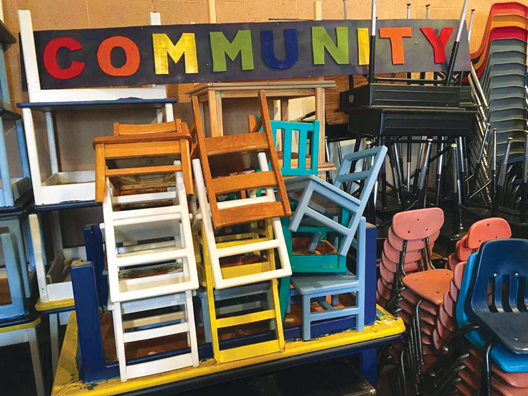Fort Worth do-gooders, you’re in good company. The 817 has a rich history of charitable giving, largely through well-funded foundations and patrons. However, starting and maintaining a charity is no easy feat, even when the mission is much needed. When donating any shekels this holiday season, keep these laudable local nonprofits in mind.
The Welman Project’s mission is simple: Take unwanted and discarded supplies from businesses (chairs, desks, office supplies) and divvy them out to Fort Worth school district classrooms and other groups in need. Co-founders Vanessa Barker and Taylor Willis salvage several dumpsters’ worth of materials a month from local landfills. They volunteer their time each week, answering phone calls, picking up supplies, and working with Welman’s network of school contacts to find the right home for donations. Cutting down on waste while supporting strapped public schools seems like an idea that’s long overdue.
Our southern neighbor Granbury is home to Project-44. The charitable ministry has donated more than 350 cars to low-income families since 2008. Single parents are prioritized in the selection process. Car donors also benefit from a significant tax deduction.
The Near Southside’s Cane Rosso partners with Cane Rosso Rescue to support local dog rescue groups and find new homes for abandoned canines. A portion of Cane Rosso sales supports the new venture. Adopting a dog from the Cane Rosso Rescue Adoption Center in Carrollton will earn you a VIP Black Card that eliminates long waits in line. There are other pizza-related perks for fostering from the shelter as well.
Feral cats will never know the joys of napping in front of a cozy fireplace or in an owner’s lap, but they can live longer, healthier lives thanks to Mid-Cities Community Cats. The volunteer-based group humanely traps the felines before vaccinating and neutering/spaying them and returning them to their original home. The idea is to lower the population of the cat colonies over time.
The arts need loving –– and donations, too. Amphibian Stage Productions has provided innovative live theater for 17 years. Through its education outreach program, Tad-Poles, the nonprofit provides stilt-walking lessons that teach choreography, music, and dance for at-risk youths.
Pairing Fort Worth school district students with enriching arts-based learning has been the mission of Imagination Fort Worth for 25 years. The nonprofit’s staff uses the arts to reinforce academic disciplines through a teaching approach known as arts integration. Think: paintings that illustrate historical events and songs that help students memorize the periodic table of elements.
Singing is only one of the skills taught at the 55-year-old Texas Girls’ Choir. The program, which consists of several choral groups, teaches etiquette and bullying awareness while providing advice on college applications. The group’s founder, Shirley Carter, would be proud to see this ensemble continue to perform locally and abroad.
The Fort Worth chapter of the Hispanic Women’s Network of Texas promotes the participation of Hispanic women in public, corporate, and civic arenas through workshops, leadership training, and academic scholarships. For Latinos, MANO (Men Advancing New Opportunities) provides mentoring opportunities that encourage academic success in college and beyond.
The WARM Place provides twice-a-month peer-support groups for children and adults who have experienced the death of a loved one. The charity provides free youth services that include drawing, painting, journaling, and other activities that encourage the kids to share feelings they might not otherwise be willing to.
One in six Tarrant County residents faces uncertain or inadequate access to food, according to the Tarrant Area Food Bank. Taste Project takes a novel approach to addressing that problem, serving up good karma and quality nutritious meals at a price anyone can afford. The three-tiered pricing includes: pay what you can afford, pay what you typically would, and pay what you typically would plus a little extra.
Homelessness often seems like an intractable problem. The current homeless count in Fort Worth is 1,594, according to the Tarrant County Homeless Coalition. Other groups, including several local shelter directors, put that number even higher. While the city, through its Directions Home program, is focused on rapid re-housing, a new nonprofit sees job placement as a priority. The Leg Up Program provides employment readiness training, résumé assistance, interview coaching, and life skills lessons, among other forms of aid.
Whatever your charitable inclinations are, do some research before giving. Nonprofits vary widely on the percentage of revenue that actually goes toward their missions. Two great resources are Guidstar.org and Charitywatch.org.












